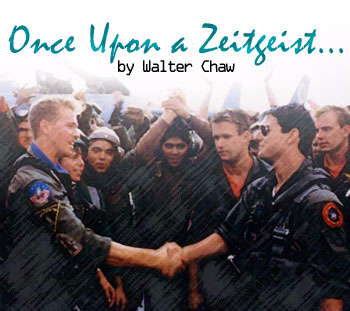
BLUE CITY – DVD
ZERO STARS/**** Image C- Sound C-
starring Judd Nelson, Ally Sheedy, Paul Winfield, Scott Wilson
screenplay by Lukas Heller and Walter Hill, based on the novel by Ross MacDonald
directed by Michelle Manning
TOP GUN [Widescreen Special Collector’s Edition] – DVD + [Special Collector’s Edition] Blu-ray Disc
*/****
DVD – Image B Sound B+ Extras B
BD – Image B+ Sound A+ (DTS) A- (DD) Extras B
starring Tom Cruise, Kelly McGillis, Val Kilmer, Anthony Edwards
screenplay by Jim Cash & Jack Epps, Jr.
directed by Tony Scott
THE LOST BOYS [Two-Disc Special Edition] – DVD
***/**** Image B+ Sound B Extras C+
starring Corey Feldman, Jami Gertz, Corey Haim, Dianne Wiest
screenplay by Janice Fischer & James Jeremias and Jeffrey Boam
directed by Joel Schumacher
BULL DURHAM [Collector’s Edition] – DVD
**/**** Image B+ Sound B+ Extras B+
starring Kevin Costner, Susan Sarandon, Tim Robbins, Trey Wilson
written and directed by Ron Shelton
by Walter Chaw Released in 1986 and tonally identical to contemporary suck classics The Wraith and Wisdom, the Brat Pack travesty Blue City represents the nadir of a year that produced Blue Velvet, Down By Law, The Mosquito Coast, Henry: Portrait of a Serial Killer, Sid and Nancy, Aliens, Ferris Bueller’s Day Off, The Fly, Big Trouble in Little China, Something Wild, Mona Lisa, and Night of the Creeps, for starters. It’s the quintessence of why people remember the 1980s as a terrible decade for film, poor in every single objective measure of quality. Consider a central set-piece where our hero Billy (Judd Nelson) and his buck-toothed cohort Joey (David Caruso) stage a weird re-enactment of the heist from The Killing at a dog track that includes not only such bon mots as “I’m new at this! Give me a break!” but also the dumbest diversionary tactic in the history of these things as Joey tosses a prime cut on the track in front of a frankly startled/quickly delighted pack of muzzled greyhounds. Then again, it’s not a bad metaphor for the Me Generation and its blockbuster mentality. After cracking wise a few times in a way that makes one wonder if he’s suddenly become a Republican, Billy blows on the barrel of his gun in his best John Ireland-meets-Montgomery Clift and professional bad editor Ross Albert (the whiz kid behind Bushwhacked, The Beverly Hillbillies, and The Pest) cracks a little wise himself by cutting to a rack of hot dogs. Unfortunately, suggesting that Judd Nelson is gay as a French holiday is only mildly wittier than suggesting the same of clearly gay Tom Cruise. More on that when we get to Top Gun.
by Walter Chaw Genre poetry from B-movies' poet laureate, Quentin Tarantino's conclusion to Kill Bill is marked by the filmmaker's carefully-calibrated celluloid insanity, as well as a deceptive maturity that allows a few powerfully-struck grace notes for the cult of femininity and the sanctity of motherhood. Its first portion overwhelming for its craft before lodging in the craw with its ever-present but tantalizingly difficult-to-nail moral code, Tarantino's epic whole clarifies a dedication to a sort of low, Samuel Fuller/Nicholas Ray tabloid cosmology, grounding itself eventually in the bold, lovely, curiously old-fashioned declaration that the last best reward is to be true to the primal clay of an idea of innate gender roles. The Bride (Uma Thurman) is so named not merely for camp grandeur's sake, but also to highlight the power of cultural archetypes and their roots in biology.

 by Walter Chaw
by Walter Chaw by Walter Chaw
by Walter Chaw